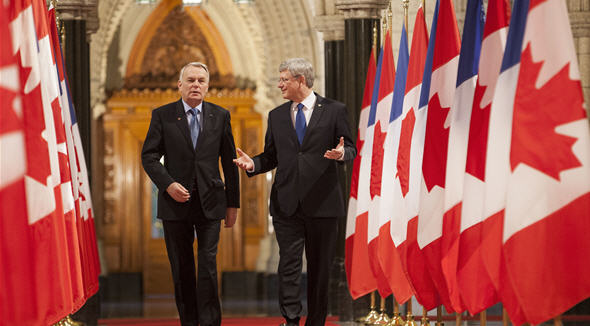The first official visit to Canada by French Prime Minister Jean-Marc Ayrault created another potential “moment” in the four-year-old CETA (Comprehensive Economic and Trade Agreement) negotiations. We certainly wondered if Mr. Ayrault would press Prime Minister Harper, and the Ontario and Quebec premiers, to be more accommodating to French and EU demands to extend patent protections for brand name drug makers — one of the several remaining problem areas in the CETA talks, according to news reports this week.
Instead, the visit culminated with a possible expanded Canadian intervention in Mali, and five new bilateral agreements on social security, CO2 capture from industrial emissions, youth mobility, entrepreneurship, and how to jointly commemorate the 1st and 2nd World Wars between 2014 and 2020. The CETA “moment” seems to have passed, at least for now, as Canadian negotiators in Brussels wait in vain for a political signal from Harper.
So when should we expect a Canada-EU trade deal to be ready? At some point this year seems to be the closest guess, though one frequent CETA commentator wonders if even that is possible. Meanwhile the Mexican government appears to have requested participation in the fledgling U.S.-EU negotiations toward a Transatlantic Trade and Investment Partnership Agreement (TTIP), with hints that Canada could also be welcomed aboard by the Obama administration.
Asked about the Mexican proposal, Ottawa embassy press attaché Raúl Saavedra told Ipolitics.ca, “At the moment there is no official statement by the Mexican government with respect to this subject.” But it seems very plausible, given EU-Mexico talks about expanding their 2002 free trade agreement.
“As well as establishing the U.S. as the key link between the giant TPP and TAFTA (TTIP) blocs, this double-headed approach would also isolate the main emerging economies — Brazil, Russia, India and above all China — if they refuse to join as presumably junior partners,” writes Glynn Moody in techdirt, commenting on statements from Mexico’s economy secretary. “That globe-spanning pair of trade pacts, it would seem, are what Obama hopes to be remembered for when he leaves office: his legacy to America — and to history.”
A NAFTA-EU free trade negotiation is the third of three fates that Michael Geist, law professor at the University of Ottawa, predicts for CETA. Geist sees trouble in the high-profile resignations of Canada’s lead trade lawyer Matthew Kronby (now with Bennett Jones LLP, offering his services to companies looking to sue Canada under NAFTA, or maybe eventually CETA, investment rules), the re-assignment of Canada’s lead agricultural negotiator, and the re-tasking of the EU’s lead CETA negotiator to handle EU-Vietnam and eventually EU-Japan talks.
Harper needs the EU to compromise on a number of areas, including beef and pork access, intellectual property rights, investment protection a-la NAFTA and FIPA, financial regulations, etc. “But with the EU the stronger of the two parties, it doesn’t see any urgency to compromise,” suggests Geist. “If CETA were the only deal on the table, it might be willing to find middle ground, but given the effect on talks with the U.S., Japan, India, and Vietnam, the Canadian deal just isn’t important enough to harm its position elsewhere.”
So Geist’s three options are: 1) Compromise, which “has failed for several years” but is the only way for Harper to declare victory; 2) “Canada simply caves to the EU demands, which “gives the government its trade deal, but with an election in 2015, caving on everything from agriculture to investor protection to pharmaceutical patents, is a risky political strategy as a CETA deal won’t win many votes but could prove costly among certain vocal constituencies,” and; 3) the already mentioned TPP for the Atlantic.
I don’t think we should celebrate any of these options. And I’m almost positive the Harper government hates this third. Look at the Prime Minister’s comments this week.
“Clearly, I think it’s advantageous for us to have such an agreement before the United States does,” he told reporters after a meeting with Ayrault, according to Reuters again. “I also think it’s important for the Europeans to have such success in North America before really launching a discussion, which will be in my opinion difficult, with the United States.”
But would Harper really have a choice if the EU and U.S. agreed that a NAFTA deal was more interesting? Yes, of course he would. He could walk away from both sets of negotiations! Some would call it naive, we would call it a public service, and the point of our four-year-old campaign to stop CETA. CETA is as rotten as Harper’s omnibus budget bills in the number of changes it will make to Canada with no public debate at all. Please help us stop another bad trade deal. Click here to find out how.



